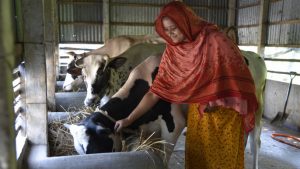Work is underway to identify additional partners to conduct pilots on up to five dairies. The goal is to test technologies and practices within NZI’s Dairy Scale for Good pillar. This initiative will enable farms of all sizes and geographies to advance environmental progress that demonstrates the economic viability of achieving net zero emissions.
The partnership with Trinkler Dairy Farm marks a key milestone in Nestlé’s $10 million investment and multi-year partnership announced last fall with NZI, which is a critical component of the U.S. dairy industry’s 2050 Environmental Stewardship Goals to achieve carbon neutrality, optimize water usage and improve water quality.
“This partnership with Nestlé and Trinkler Dairy Farm is a powerful example of the innovative collaborations needed to scale knowledge and new innovations that will make the transition to net zero emissions a reality,” said Mike Haddad, chairman of the Innovation Center for U.S. Dairy.
Trinkler Dairy Farm has been supplying milk to CARNATION® since 2014. With an initial $1.5 million investment from Nestlé, the dairy will install technology and incorporate practices that significantly reduce its greenhouse gas emissions, with the goal of achieving a reduction of 30 percent by 2023 and to achieve net zero emissions within five years.
“We are embarking on a path to achieve net zero emissions, building on practices we use today that protect our land, our cows’ welfare and our family business for future generations,” said Jon Rebiero, manager of Trinkler Dairy Farm. “We’re excited to be at the start of a movement that will transform the future of the dairy industry.”
The initiative focuses on feed production, enteric methane reduction, energy efficiency and manure management. Caleb Harper, who serves as executive director of the Dairy Scale for Good pilot program, stressed that economic viability and the ability to diversify revenue streams are key factors for farmers who choose to participate in this project.
“This is about demonstrating improved environmental impacts but it’s also very much about offering an economic return to the dairy farmers,” Harper said. “Partnerships such as ours with Nestlé gives us the ability to take concepts and put them into everyday farming businesses that we can learn from. This pilot work reduces the risk of investment so it can be applied to all farms across the U.S. to improve environmental performance and the farmer’s bottom line.”
The impact at Trinkler Dairy Farm will be assessed using science-based measurement tools, and the data will be analyzed by checkoff and academic scientists beginning next year. Nestlé will scale the solutions implemented at the farm to more dairy farms in the coming years.
The work is critical to Nestlé’s goal of achieving net zero emissions by 2050 because most of its emissions stem from its supply chain. Dairy accounts for approximately 16 percent of Nestlé’s overall U.S. carbon footprint, and about three percent comes from milk sourced from 13 dairies in Modesto, Calif. According to Nestlé’s Net Zero Roadmap, which is based on the Science-Based Targets initiative, net zero emissions are achieved when GHG emissions to the atmosphere are balanced by removal of GHG emissions over a specified period. Currently, U.S. dairy accounts for less than 2 percent of total U.S. GHG emissions.
“Our consumers expect that we will deliver products made with high quality, fresh dairy, and they expect we will do that in a sustainable way that is better for the planet,” said Steve Presley, Chairman and CEO, Nestlé USA. “As the first farm to join Dairy Scale for Good, our Carnation supplier is charting the path toward carbon neutral dairy in the U.S. This is an exciting step toward delivering on consumer demands while advancing our journey toward net zero emissions by 2050. We are using our scale to have a positive impact within our business and supply chain, while working to propel the industry forward and create a more sustainable future.”













